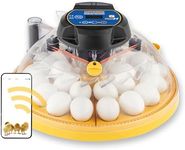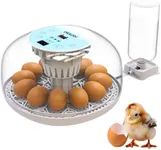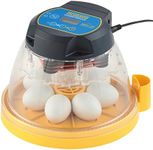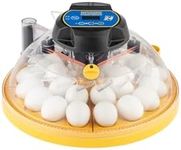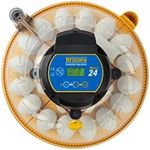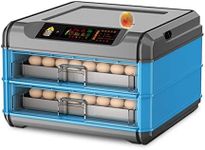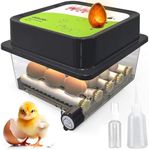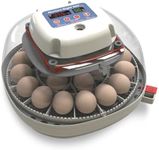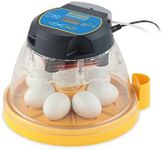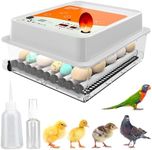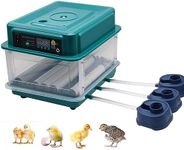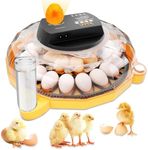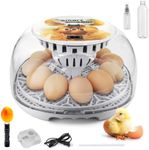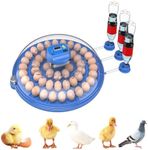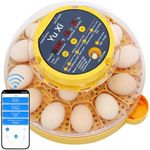Buying Guide for the Best Egg Incubators
Choosing the right egg incubator is crucial for successfully hatching eggs, whether you're a hobbyist or a professional breeder. The incubator you select should match your needs in terms of capacity, ease of use, and the types of eggs you plan to hatch. Understanding the key specifications will help you make an informed decision that ensures the best possible hatch rate.CapacityCapacity refers to the number of eggs an incubator can hold at one time. This is important because it determines how many eggs you can incubate simultaneously. Incubators come in various sizes, from small models that hold a few eggs to large ones that can accommodate hundreds. If you're a hobbyist or have a small flock, a smaller capacity may suffice. However, if you're a breeder or have a large operation, you'll need a larger capacity to meet your needs. Consider the number of eggs you plan to hatch regularly to choose the right capacity.
Temperature ControlTemperature control is crucial for maintaining the optimal environment for egg development. This specification ensures that the incubator can maintain a consistent temperature, which is vital for successful hatching. Incubators may offer manual or automatic temperature control. Automatic control is generally easier and more reliable, especially for beginners, as it adjusts the temperature automatically. If you have experience and prefer more control, manual settings might be suitable. Choose an incubator with precise temperature control to ensure the best hatch rates.
Humidity ControlHumidity control is another critical factor in egg incubation, as it affects the moisture level inside the incubator. Proper humidity levels are essential for preventing dehydration of the eggs and ensuring healthy development. Some incubators have built-in humidity control systems, while others require manual adjustments. Automatic systems are convenient and reduce the risk of human error, making them ideal for beginners. If you have experience, you might prefer manual control for more flexibility. Consider your comfort level with managing humidity when choosing an incubator.
Egg TurningEgg turning is a feature that mimics the natural process of a hen turning her eggs, which is important for embryo development. Incubators can have manual or automatic egg turning systems. Automatic turning is more convenient and reduces the risk of forgetting to turn the eggs, which can lead to poor hatch rates. Manual turning requires more attention and effort but can be suitable if you prefer hands-on involvement. If you're new to incubation, automatic turning is recommended for ease and reliability.
VentilationVentilation ensures that fresh air circulates within the incubator, providing oxygen to the developing embryos and removing excess carbon dioxide. Proper ventilation is crucial for maintaining a healthy environment inside the incubator. Some models have adjustable ventilation systems, allowing you to control airflow. If you're incubating a variety of egg types, adjustable ventilation can be beneficial. Consider the types of eggs you plan to incubate and choose an incubator with adequate ventilation to support their specific needs.
